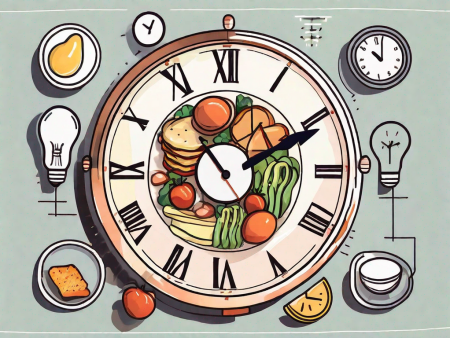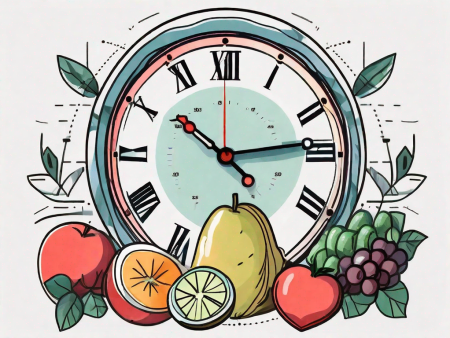Discover the fascinating connection between muscle mass and metabolism.
How Does Muscle Mass Impact Metabolism?
Do you ever wonder why some people seem to effortlessly maintain a slim figure while others struggle to shed those extra pounds? Well, the secret might lie in their muscle mass and its impact on their metabolism! Yes, you heard it right – muscle mass can have a significant influence on how your body burns energy and how efficiently it functions. So, let’s dive into the fascinating world of metabolism and uncover the relationship between muscle mass and this metabolic marvel!
Understanding the Basics of Metabolism
Before we delve into the specifics, let’s get acquainted with the basics of metabolism. In simple terms, metabolism refers to the processes by which your body converts the food you eat into energy. It’s like a well-choreographed dance routine happening inside your cells that keeps everything up and running!
Metabolism is not just a single process; it’s a collection of chemical reactions that occur in your body to sustain life. These reactions are responsible for extracting energy from the food you consume and using it to power various bodily functions.
Imagine your body as a complex machine with countless moving parts. Metabolism is the engine that keeps this machine running smoothly. It’s the driving force behind everything your body does, from breathing and circulating blood to repairing cells and even regulating your body temperature.
The Role of Metabolism in the Body
Metabolism plays a crucial role in various bodily functions. It’s responsible for powering your brain, allowing you to think, reason, and make decisions. Without metabolism, your brain would cease to function, leaving you in a state of mental fog.
Additionally, metabolism is essential for digestion. When you eat a meal, your body breaks down the food into smaller molecules through a process called catabolism. These molecules are then absorbed into your bloodstream and transported to cells throughout your body, where they are used as fuel.
Metabolism also plays a vital role in repairing cells and tissues. Every day, your body undergoes wear and tear, and metabolism helps to rebuild and replace damaged cells. It’s like a constant construction crew working tirelessly to keep your body in top shape.
Furthermore, metabolism is involved in regulating your body temperature. When you’re exposed to cold temperatures, your metabolism ramps up to generate heat and keep you warm. Conversely, in hot weather, your metabolism slows down to conserve energy and prevent overheating.
The Process of Metabolism
Metabolism is a complex process, but let’s simplify it a bit. It can be divided into two main parts: catabolism and anabolism.
Catabolism involves breaking down substances (like carbohydrates, fats, and proteins) to release energy. When you eat a meal, enzymes in your digestive system break down the food into its basic components. Carbohydrates are broken down into simple sugars, fats into fatty acids, and proteins into amino acids. These smaller molecules are then transported to cells, where they undergo further breakdown to release energy.
Anabolism, on the other hand, focuses on using the energy obtained from catabolism to build and repair cells and tissues. This process involves the synthesis of complex molecules from simpler ones. For example, amino acids are used to build proteins, and simple sugars are converted into glycogen for storage.
It’s important to note that metabolism is not a one-size-fits-all process. Each person’s metabolism is unique and influenced by various factors, including genetics, age, sex, body composition, and activity level.
Now, let’s shift our attention to the intriguing connection between muscle mass and metabolism!
But before we do that, let’s take a moment to appreciate the complexity and importance of metabolism in our daily lives. It’s a fascinating symphony of chemical reactions that allows us to thrive and function. So next time you enjoy a delicious meal or feel the warmth of the sun on your skin, remember that it’s all thanks to the incredible power of metabolism!
The Connection Between Muscle Mass and Metabolism
Did you know that muscle mass acts as a metabolic powerhouse? Indeed, your muscles deserve a standing ovation for their contribution to energy expenditure!
But let’s dive deeper into the fascinating relationship between muscle mass and metabolism.
The Metabolic Demand of Muscle
When it comes to energy consumption, muscles are like a bunch of eager beavers. They require energy not only to perform movements but also to maintain themselves when at rest. In fact, even when you’re lounging around binge-watching your favorite show, your muscles continue to burn calories, thanks to their high metabolic demand.
Think about it – your muscles are constantly working, even when you’re not actively using them. They are responsible for supporting your posture, keeping your body stable, and ensuring proper alignment. All of these tasks require energy, which translates into calories burned.
But that’s not all. Your muscles also play a crucial role in regulating body temperature. When you’re cold, your muscles contract involuntarily to generate heat, a process known as shivering. This thermogenic effect of muscle activity further contributes to the overall energy expenditure.
How Muscle Mass Influences Metabolic Rate
Here’s the fascinating twist – the more muscle mass you have, the higher your basal metabolic rate (BMR) tends to be. Your BMR is the number of calories your body needs to carry out basic functions at rest. So, having mighty muscles means that you burn more calories throughout the day, even when you’re not doing anything strenuous. Talk about an efficient energy-burning machine!
But why does muscle mass have such a profound impact on metabolic rate? It all comes down to the fact that muscle tissue is more metabolically active than fat tissue. In other words, muscle cells require more energy to function compared to fat cells.
When you engage in strength training exercises, you stimulate the growth and development of muscle fibers. This increase in muscle mass leads to a higher proportion of metabolically active tissue in your body. As a result, your BMR rises, and you burn more calories even during periods of rest.
Additionally, muscle mass also plays a role in post-exercise calorie burn. After a challenging workout, your muscles need to repair and recover. This process, known as excess post-exercise oxygen consumption (EPOC), requires energy. The more muscle mass you have, the greater the EPOC effect, leading to additional calorie burn long after your workout is over.
So, if you’re looking to rev up your metabolism and increase calorie burn, it’s time to hit the weights and build some muscle. Not only will you sculpt a stronger and more toned physique, but you’ll also become a more efficient calorie-burning machine, even when you’re enjoying some well-deserved relaxation.
The Impact of Muscle Loss on Metabolism
Unfortunately, as we age, our muscles often decide to play a disappearing trick on us. This muscle loss, known as sarcopenia, can have a significant impact on our metabolism, among other things.
Sarcopenia, the gradual loss of muscle mass and strength, is a natural part of the aging process. It typically begins around the age of 30 and accelerates after the age of 50. This decline in muscle mass not only affects our physical appearance but also has far-reaching consequences for our overall health and well-being.
Age-Related Muscle Loss and Metabolism
As time passes, our bodies become less efficient at building and maintaining muscle mass. Consequently, this decline in muscle can slow down our metabolism. With sarcopenia creeping in, our once sprightly metabolic engine starts to sputter and lose some of its fuel-burning prowess.
When we have less muscle mass, our basal metabolic rate (BMR) decreases. BMR refers to the number of calories our body needs to perform basic functions at rest, such as breathing, circulating blood, and maintaining body temperature. With a lower BMR, our bodies burn fewer calories, making it easier to gain weight and harder to lose it.
Furthermore, muscle tissue is metabolically active, meaning it burns more calories than fat tissue. So, when we lose muscle mass, our overall calorie expenditure decreases, making it even more challenging to maintain a healthy weight.
The Effects of Sedentary Lifestyle on Muscle Mass and Metabolism
A sedentary lifestyle is like a villain that robs us of our muscle mass and negatively impacts our metabolism. By spending most of our time sitting and not engaging in regular physical activity, we discourage our muscles from growing and functioning optimally. It’s like pressing the snooze button on our metabolism, rendering it less efficient and sluggish.
When we lead a sedentary lifestyle, our muscles are not stimulated enough to grow and maintain their strength. This lack of physical activity leads to muscle atrophy, where the muscle fibers shrink and weaken. As a result, our metabolism takes a hit, as muscle tissue is a major contributor to our overall calorie expenditure.
Moreover, a sedentary lifestyle often goes hand in hand with weight gain and an increase in body fat percentage. Excess body fat further exacerbates the negative effects of muscle loss on metabolism, creating a vicious cycle of weight gain and muscle decline.
To counteract the detrimental effects of a sedentary lifestyle, it is crucial to incorporate regular exercise into our daily routine. Strength training exercises, in particular, can help build and maintain muscle mass, revving up our metabolism and promoting overall health and longevity.
Building Muscle to Boost Metabolism
If you’re ready to rev up your metabolism and make it work in overdrive, building muscle is the key!
The Role of Exercise in Increasing Muscle Mass
Exercise, especially strength training, is like a superhero that swoops in to save the day when it comes to building muscle mass. By engaging in activities like weightlifting, resistance training, or bodyweight exercises, you can stimulate muscle growth and improve your metabolism.
Nutrition for Muscle Growth and Metabolism
Of course, exercise alone won’t do the trick. Proper nutrition is essential for supporting muscle growth and ensuring a firing metabolism. Focus on consuming adequate protein, complex carbohydrates, and healthy fats to provide your body with the necessary building blocks for muscle development.
Debunking Myths About Muscle Mass and Metabolism
Now that we’ve covered the essentials, let’s bust some common myths floating around about muscle mass and metabolism!
The Truth About Muscle, Fat, and Metabolic Rates
Contrary to popular belief, muscle doesn’t magically transform into fat when you stop exercising. They are two distinct tissues that behave differently in your body. Muscle, being metabolically active, continues to burn calories even if you take a break from your fitness routine.
Addressing Common Misconceptions
Some folks believe that women can’t build muscle as effectively as men. Well, the truth is that women are just as capable of building muscle and reaping the metabolic benefits. So ladies, don’t shy away from strength training – your muscles and metabolism will thank you!
Now that you’re armed with knowledge about the fabulous relationship between muscle mass and metabolism, it’s time to put it into action. Embrace strength training, nourish your body with wholesome foods, and harness the power of your muscles to boost your metabolism and achieve your wellness goals. Your metabolism will be roaring like a powerful engine, propelling you towards a healthier, more vibrant life!








Your article helped me a lot, is there any more related content? Thanks!
buy priligy in uae Adalimumab Humira
priligy dapoxetine 25 Ed well about 3days ago for sum reason that knott was agrivated sore and swelled slightly, so I started nolvadex at 20 mgs for the past 3days